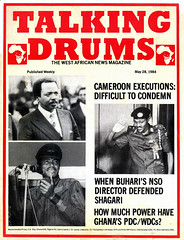What The Papers Say
Victory for the ANC
The Guardian, Nigeria
Despite the deliberate attempts by the Western media to play down the import, last weekend's attack on a strategic refinery in Durban, apartheid South Africa, by partisans of the African National Congress (ANC) is a significant devel opment in the liberation war. The liberation fighters were able to do major damage to the refinery, destroy a ware house and bomb a 25-storey building housing the interior minister.The attack is a signal that the liberation war is not stymied by the peace pacts signed between the governments of Angola and Mozambique with South Africa, even if this development causes more difficulties for the war effort. The success of the Durban attack also shows as premature the chest-thumping by the apartheid government and its friends and collaborators abroad as to the success of South Africa's policy of aggression in the region.
The justice of the liberation cause and the resoluteness of the majority black population can only ensure the certainty of victory. Lessons in resoluteness have after all been provided by the success of similar protracted liberation wars in Africa and other parts of the world.
Thus while the non-aggression and good neighbourliness "pacts" signed between South Africa and the Angolan and Mozambican governments definitely acts as a constraint on the liberation fighters in the sense that sanctuaries can no longer be guaranteed in these countries, the daring attack in Durban shows that this need not be a crippling development.
The ANC should now intensify the building of cells and the development of sanctuaries within South Africa itself. This would be a much more assured way of bearding the racist lion in his laager. The least African nations can contribute is the provision of material and diplomatic support for the intensification of the struggle until final victory, certain as it is, is won.
No, Mr. Attorney General
Sunday Concord, Nigeria
As the Attorney General and Minister of Justice of the federation it is the place of Mr Chike Ofodile (SAN) to defend the actions of government, particularly those actions that have to do with the country's laws. Mr Ofodile probably thought he was only doing his job therefore when he went on an Ogun State Television programme recently to declare that whatever rights Nigerians have are rights enjoyed under the law and that for that reason, whenever the law comes up against fundamental rights, the latter must give way.Now, there can be no quarrel with the Attorney General's sense of duty. Indeed, what Nigeria requires in public officers at this time is the kind of commitment which Mr Ofodile has demonstrated so far. But this notwithstanding, it is difficult, very difficult indeed, to agree with his reasoning on the relationship between laws and fundamental human rights.
For a start, fundamental rights are so called precisely because they are fundamental. This implies that such rights are inalienable and should not, in any way, be tampered with. The issue, where fundamental rights are concerned, is not, and should never be, whether or not the state has the power to make laws. Even in a situation where representative government does not exist, as is the case with Nigeria today, what powers the state exercises is derived from the people and are meant to be exercised in their trust. Government, if it actually exists to serve, is obliged to make only those laws that can truly protect the governed.
If the argument that the power of the state to make laws, all manner of laws, takes precedence over fundamental rights is stretched further, it could well mean that government should not be questioned even if it decides to decree the simple act of breathing illegal! It could also mean that there is nothing wrong really with the apartheid laws of South Africa! Ridiculous? Yes. But so is the entire doctrine of supremacy of laws over human rights.
Apart from being ridiculous, the idea that laws come first, and rights, a long way second, is downright dangerous. For, it could easily provide the doctrinal justification for a mode of governance that holds the wishes of the governed in contempt. True, Nigeria is under military rule today. And military rule is not exactly a representative form of government. But in spite of this, or even because of it, the point must be made, and emphatically too, that in the closing years of the twentieth century it is universally and rightfully considered in bad taste for the state to place itself, or its laws, in juxtaposition to certain rights enjoyed by man. It is also considered beyond the powers of the state to seek to make laws on all aspects of human existence.
As it is, the state, even at its democratic best, is oppressive enough an instrument. For it to be allowed total and unquestionable sway over our every action, as Mr Ofodile suggests, would be a direct affront not just to our rights, but even to our humanity as well.
The Attorney-General's job is by no means an easy one. Defending the actions of a military government, particularly for a lawyer, is bound to take its toll on reason. Still there can be little excuse for the kind of defence he has advanced for the steady erosion of the fundamental rights of Nigerians in recent times.
It is only hoped that the Federal Military Government does not share Mr Ofodile's reasoning that fundamental rights of Nigerians must be subordinated to its power to promulgate as many decrees as can be printed in the Government Gazette.
For Nigerians, ever jealous of their rights and freedoms, would find the outcome of such reasoning totally unacceptable.
